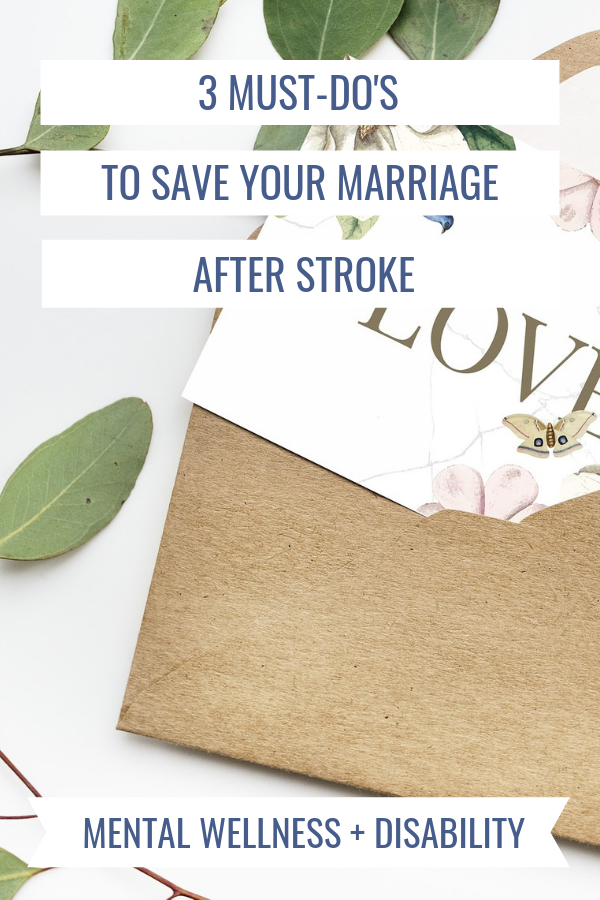If your partner has had a stroke, you may be feeling lost in your marriage. It can feel like you’ve shifted into the role of nurse, or even parent, to this person who used to be your equal. You may wonder if they’ll ever really be your partner again.
Of course, you may not even have time to think about your relationship because there’s so much to do.
The endless flurry of therapies and appointments to get to. The day-in, day-out physical care-giving that you must provide. It can feel like you’ll never again be able to take 5 minutes for yourself.
Devoting time and energy to improving your marriage can feel like a luxury that you can’t afford right now.
Of course, many caregivers don’t know where to begin even if they find the time. How do you love someone who looks like your old spouse, but who behaves, thinks, and acts completely differently?
Sadly, you’re not alone in these feelings.
Some new research supports that many married couples struggle to figure out how to love one another after one of them has a stroke. You can read this article for more insight.
I hear this uncertainty echoed in my counseling practice when I provide therapy to the spouses of stroke survivors. They describe still loving their partner, but at the same time resenting the role changes that have happened since the stroke. Caregivers feel overwhelmed by their new daily routines, and the new demands placed on them. They miss having their partner to lean on, to laugh with, and to learn from. Maybe more than anything, they just feel fatigued.
You may be feeling unsure of how to make your marriage work after your spouse’s stroke.
Read on to learn 3 helpful things that you can do to feel more connected to your spouse after they have had a stroke.

1. Be connected to your partner’s therapy, even if you can’t participate in it.
Many caregivers struggle with financial demands after their partner has a stroke. While they’d like to be home with their partner, financially, they must keep working. When I see these caregivers in my office, they often feel guilty that they aren’t attending and participating in their loved one’s therapies.
Or, maybe you are attending every appointment with your spouse. It can still feel overwhelming to sit in a chair in the corner and watch every speech therapy activity or PT exercise. Some caregivers recognize that, when their loved one is in therapy, it gives them a dedicated respite time.
I completely understand if you use this time to grab a cup of coffee, listen to a podcast, write in a journal, or simply enjoy silence.
Whatever the reason, even if you aren’t attending your loved one’s therapy, it will still benefit you both for you to be aware of what’s going on during therapy.
You can ask your partner’s therapist to write up an ‘Ask me about board’ at the end of each group or session.
This board is a place for the therapist to write down 3 things to guide your conversation with your loved one about what they did in therapy. It gives you some clues as to what to ask about, and it can help to spark your partner’s memory.
Here’s an example of an Ask me about board written for a St. Patrick’s Day themed speech group meeting.

The group leader or therapist might email the points to each caregiver after each session. Or, your loved one can simply take a picture of the board to show you later that evening.
Your conversations based on the day’s topics can help to restore your partner’s cognitive flexibility, working memory, and language processing following a stroke. Of course, these aren’t just skills that matter for their rehabilitation goals. These are the fundamental thinking and communication skills that you’ve missed since your partner’s stroke.
Your spouse may be likely to answer ‘good’ or ‘fine’ if you ask “how was x?”. If that’s their tendency, challenge yourself to ask more detailed or interesting questions. Some examples are:
- What did you learn that surprised you in the trivia game? Is there anything that you want to learn more about that you hadn’t known about before?
- Did you sing more sad songs or more funny songs? Did anyone get up and dance to the music?
- Which member of your group wrote the most creative limerick? What was it about?
2. Always be working toward a mutual goal.
I don’t mean that you and your spouse should spend every minute together. In fact, most caregivers would benefit from taking more time than they feel they deserve for self-care.
What I’m encouraging you to do here is to have a continually evolving shared vision with your spouse of a ‘next’ challenge that you’re working toward together.
For instance, suppose you and your spouse enjoy traveling. You might each put the names of 3 places you’d like to travel to into a hat. You pick one, and together you plan a trip to that destination. When you arrive home from that trip, you go back to the hat. Add one new place to the hat, and pick out the next place you’ll travel to.
Some trips may take longer than others to plan or save for. That’s OK. The goal is for each of you to be always working together to either plan a trip or be traveling.
You could do this with any meaningful activity, it needn’t be travel.
Perhaps you alternate choosing a new recipe for you to prepare together. You’d map out when you’d buy the ingredients, and go to the market together to purchase them. Then you’d spend the evening in the kitchen sharing responsibility for cooking the meal together.
Or you agree to take different types of dance classes together. Perhaps your spouse suggests that first you sign up for a couples’ ballroom class. Then when that class has ended, you get to choose whether you’ll do swing, tap, or hip-hop classes.
Some couples just choose to pick a different type of challenge at each opportunity. Perhaps they first walk a 5k together, and then take a digital photography class, and then an Indian cooking class.
That you choose to be working towards something together matters much more than what you choose as your goal.
3. Maintain a growth mindset
A fixed mindset is a state of being stuck. It’s saying “I can’t do this, so I won’t ever be able to do this.”
A growth mindset, on the other hand, is saying “I can’t do this yet. But, I can continue to learn more and to try to find new ways to solve the problem.”
The two mindsets were set forth by Dr. Carol S. Dweck in her book Mindset: The New Psychology of Success.
Having a growth mindset is a powerful asset, especially in times of crisis. A growth mindset motivates you to continue to approach challenges with enthusiasm.
When your partner is recovering from a stroke it is especially important to not get stuck in a fixed mindset.
Imagine you are doing something that your spouse used to do that’s now your responsibility. Maybe paying your bills online. You’re feeling confused and frustrated.
Your spouse calls to you from the kitchen that they need you to come make them a sandwich.
If you have a fixed mindset, your thoughts sound like:
“Great, now I have to drop what I’m doing to make a sandwich. I’ll be making sandwiches every day for the rest of my life. But I’ll be doing it in the dark since I can’t pay the stupid light bill.”
But a growth mindset approach sounds like:
“He can’t make a sandwich for himself yet. But he can hold a knife steady in his hand, and he wasn’t able to do that 3 months ago. He is getting closer to being able to make himself a sandwich. And I can learn new things, too. 20 years ago no one knew how to pay a bill online, and now everyone can do it. If everyone else can learn, so can I.”
Even though what you’re facing is the same challenges, a growth mindset enables you to have hope for the future.
Summary
I hope that these action-oriented strategies can help you feel more connected to your spouse after they have experienced a stroke.
Of course, I know that the real key to saving your marriage after stroke is learning to not view the new challenges as just your problem or just your spouse’s problem.
The real healing in marriage happens when you come to view the stroke and the resulting challenges as your problem to navigate and cope with together.
Keep reading
Other posts you may be interested in
Eight Tips to End Your Marriage with Dignity After Your Spouse Becomes Disabled
When your spouse becomes disabled, your whole world changes in an instant. The plans you’d made for the future all crumble away. Suddenly, your life feels like an endless stream of doctor’s appointments and therapy groups. It may feel like you know longer really know...












